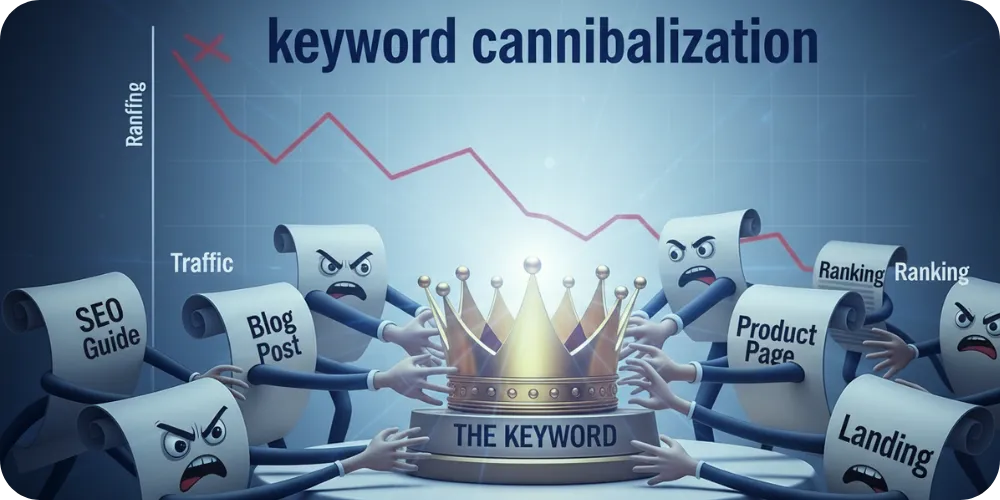Many people believe that their chances of ranking will rise if they publish more content related to the same keyword. However, in practice, it may backfire. Keyword cannibalization is the term for this problem. It occurs when Google is forced to choose between several pages on your website that are vying for the same keyword. It can lower your traffic and undermine your entire SEO strategy rather than increase visibility.
What Keyword Cannibalisation Really Means
Keyword cannibalisation simply means you’re competing with yourself. For example:
- Regarding "best running shoes," you write three blog entries.
- Every post focuses on the same keyword.
- Google is perplexed when it sees three options rather than a single high-ranking page.
The outcome? Your content competes against itself. Impressions are limited and the SEO performance is weak.
Why Too Many Pages Targeting the Same Keyword Backfires
When you spread one keyword across many pages, you’re also splitting your authority. Here’s how it hurts:
- Diluted rankings: Rankings are diluted because no page is powerful enough to rank highly.
- Lost backlinks: Rather than linking to a single primary resource, other websites may link to distinct pages.
- Poor user experience: Content that is repeated or overlapped is seen by visitors.
- Missed conversions: The traffic that does reach your website might end up on the incorrect page.

How Google Chooses Between Your Competing Content
Google’s goal is to serve users the best possible answer. When you have multiple pages on the same keyword, Google tests different ones to see which works best. That can mean:
- Rankings constantly shuffle between your pages.
- An outdated article might appear instead of your most optimized one.
- Your content looks less authoritative compared to a competitor’s focused, single page.
Simple Fixes to Stop Losing Traffic to Yourself
The good news is that keyword cannibalisation is easy to spot and fix. Here are practical steps:
Audit your content
Search your main keywords in Google using the site:yourdomain.com keyword. This shows if multiple pages from your site are ranking for the same keyword.
Merge or consolidate pages
When two or more pages discuss the same subject, merge them into a single, valuable article and reroute the previous URLs.
Prioritize your best page
Update the strongest page with new content and internal links that point to it, signaling to Google it’s the primary source.
Use varied keyword targeting
Instead of repeating the same keyword, target related terms (synonyms, long-tail variations, or subtopics) to make each page unique.
Set clear content goals
Decide in advance: one page = one topic. This keeps your site organized and prevents overlap in the future.
Final Thoughts
Keyword cannibalization may sound technical, but it's really just a matter of focus. Instead of having too many pages fighting for the same keyword at the end, try to have one strong keyword per page. Your first goal should just to create a high-quality page that serves the searcher. When removing duplicates, to consolidate pages and using only the target keywords, you will create a site that Google can index more easily and be more helpful for your users. You can convert lost traffic into consistent growth in this way.




%20(824%20x%20550%20px)%20(1).png)
.png)
.png)
.png)

.webp)
.webp)
.webp)
